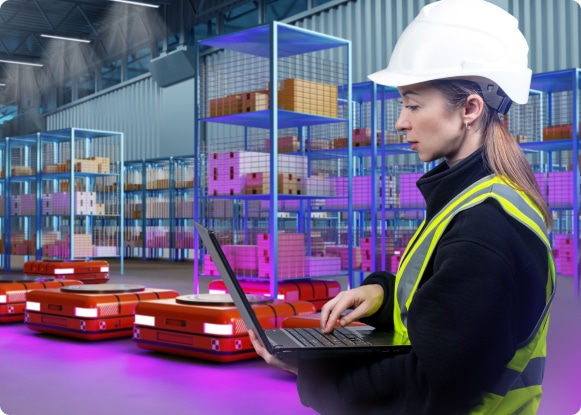Robot revolution: what does this mean for the workers?
Across the world, warehouse automation is on the rise, fuelled by companies’ need to improve their operational efficiency. But what are the impacts on workers?
On July 4, 2023

Across the world, warehouse automation is on the rise, fuelled by companies’ need to improve their operational efficiency. But what are the impacts on workers?
On July 4, 2023
Through his long-term experience in warehouse automation, Loïc Delaître, FM Logistic Automation Director, explains how automation is evolving to provide workers with a safer, more meaningful and valuable work experience.
Even if automation raises concerns and anxiety amongst workers, I believe that its net impact is positive. With robots, repetitive and painful actions are considerably reduced, which frees workers to take on more value-added and complex tasks. Their mental load is reduced thanks to more intuitive systems while ergonomics is optimised, reducing the risk of MSDs and, therefore, work stoppages. These changes contribute to making workers’ jobs safer, more rewarding and meaningful. As a result, it improves their satisfaction and instils a particular pride, resulting into increased productivity.
Workers’ number one concern about automation is the fear of losing their jobs. But they quickly realise that automation will make their lives easier and improve their working conditions. Automation eliminates jobs (especially the most arduous or basic ones) but it also creates many job opportunities. We need more skilled operators to work on automated lines, such as flow orchestrators, as warehouse automation requires a perfect synchronisation of all the automation bricks using IT management tools. The rise of robots also requires more maintenance than manual processes. At FM Logistic, we ensure that our teams receive all the support they need to ensure the great success of a project. When we roll out an automation project, we train the existing teams to upgrade their skills. This opens up new career prospects for the operators, who see their know-how as highly valued.
Through automation, workers experience safer and more rewarding jobs as repetitive and painful tasks are reduced. As a result, it improves their satisfaction and instils a particular pride, resulting into increased productivity.
As part of an AutoStore that we are deploying in the Czech Republic for one of our customers, we are installing a “goods-to-person” order-picking system where products are delivered directly to the operator using computerised systems. The goods are stored in bins, and the operator doesn’t have to move around to place his order: this static position reduces the risks of errors and accidents. In addition, the operator is at the correct ergonomic working height, so he can perform his tasks with no risks of injuries. We have improved working conditions, hence productivity because the mental workload is completely reduced as workers tasks become much simpler. Being static does have its drawbacks, but we make sure that our operators are multi-skilled. They rotate jobs every two hours, which makes the day less monotonous: they can do order taking, replenishment, receiving and shopping.
With technological developments regarding robots, machine vision and IA, automation focuses more on people and their safety. Today’s robots are increasingly collaborative: equipped with sensors, they are capable to pick up any 360-degree movements in their environment (from small fork heights to large trucks or operators) and to adapt their speed according to the obstacle. For example, automated mobile robots (AMRs) are far more advanced than the old automated guided vehicles (AGV), which stop when they encounter an obstacle. AMRs are equipped with a safety capsule, and thanks to their vision camera, they can adopt the right attitude, ensuring operators are not endangered. They also require little training and offer higher flexibility.
Warehouse work is becoming more strategic for our clients. Thanks to automation, it has the potential to solve many of their issues, to empower their employees and to create a more meaningful and efficient work environment. In the future, we will need more skilled workers and it is our responsibility to support their career development. People who work in automation today are highly valued and in high demand. There’s a real competition between companies to recruit and retain people capable of working with automated systems.
How can we help you ?
Fill in the form